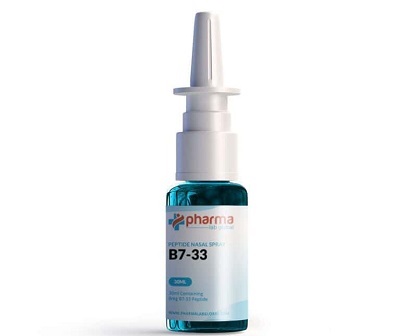How B7-33 Improves Heart Function


B7-33 peptide is a synthetic version of human relaxin-2, crafted to leverage the therapeutic benefits of relaxin signaling while reducing undesirable side effects. It primarily targets the relaxin receptor RXFP1, leading to anti-fibrotic, anti-inflammatory, and cardiovascular protective effects. Unlike traditional relaxin treatments, B7-33 is engineered to focus on pathways that reduce fibrosis (excessive tissue scarring), positioning it as a promising treatment for conditions like cardiac fibrosis, pulmonary fibrosis, acute heart failure, and organ damage.
Beyond its tissue-protective qualities, B7-33 has demonstrated potential in lowering blood pressure, enhancing wound healing, and improving vascular function. Its influence on the extracellular matrix makes it a key player in regenerative medicine, particularly in heart failure therapies. What sets B7-33 apart from full-length relaxin is its targeted approach, offering a safer, more focused alternative with fewer systemic effects. Ongoing research is diving into its broader therapeutic potential, especially in cardiovascular and fibrotic diseases.
The compound is poised to play a significant role in advancing treatments for conditions like fibrosis, as highlighted in B7-33: Revolutionizing Fibrosis Treatment.
Studies into the effects of B7-33 peptide suggest it offers a range of health benefits:
Anti-fibrotic properties
Cardiovascular protection
Anti-inflammatory effects
Wound healing and tissue regeneration
Potential treatment for pulmonary, liver, or kidney fibrosis
B7-33 peptide is a synthetic form of human relaxin-2, which selectively activates the relaxin receptor RXFP1. This activation drives a cascade of effects that promote anti-fibrotic, anti-inflammatory, and cardiovascular benefits. Unlike traditional relaxin, B7-33 is specifically engineered to target fibrosis-reducing pathways, minimizing unnecessary systemic effects.
When B7-33 binds to RXFP1 receptors, it stimulates the production of nitric oxide (NO), which leads to vasodilation and better blood flow. This helps lower blood pressure and eases the strain on the heart. In addition, it inhibits TGF-β signaling, a key driver of fibrosis, preventing the buildup of collagen in vital organs like the heart, lungs, and liver.
B7-33 also plays a role in modulating the extracellular matrix, which supports tissue repair and regeneration while reducing inflammation. Its ability to target fibrotic and cardiovascular pathways makes it an exciting therapeutic option for conditions like heart failure, pulmonary fibrosis, and chronic inflammatory diseases.
Research using both human and animal models indicates that B7-33 may have significant clinical applications in the following areas:
B7-33 peptide shows substantial potential in combating fibrosis by activating the relaxin receptor RXFP1. This receptor controls tissue remodeling and repair. By inhibiting TGF-β signaling, B7-33 prevents excessive collagen buildup and scarring in organs such as the heart, lungs, liver, and kidneys. Furthermore, it enhances nitric oxide production, improving blood flow and reducing inflammation, which helps slow the progression of fibrosis. Unlike conventional treatments, B7-33 targets fibrosis at its root cause while minimizing side effects, making it a promising solution for cardiac, pulmonary, and organ fibrosis in chronic conditions.
B7-33 offers considerable cardiovascular protection by engaging the RXFP1 receptor, which is instrumental in vasodilation, anti-fibrotic actions, and heart function. A primary mechanism is the stimulation of nitric oxide (NO) production, which helps relax blood vessels, improve circulation, and lower blood pressure, thereby easing the burden on the heart.
In vitro studies have shown that B7-33 inhibits TGF-β signaling, which prevents cardiac fibrosis—an ailment where collagen builds up in the heart muscle, causing stiffening, heart failure, and diminished cardiac efficiency. By reducing inflammation and oxidative stress, B7-33 preserves heart tissue, enhancing overall cardiovascular health.
What makes B7-33 distinct from other relaxin-based treatments is its focused approach, targeting beneficial cardiovascular pathways while reducing systemic side effects. This makes it a promising candidate for managing hypertension, heart failure, and other cardiovascular disorders. Research into its full therapeutic potential is still ongoing.
B7-33 peptide demonstrates powerful anti-inflammatory properties by selectively activating the RXFP1 receptor, which regulates immune responses and tissue repair. One of its key actions is the suppression of pro-inflammatory cytokines like TNF-α and IL-6, which contribute to chronic inflammation and tissue damage. By curbing these inflammatory signals, B7-33 helps protect organs from fibrotic and degenerative diseases.
Additionally, B7-33 inhibits TGF-β signaling, a major driver of inflammation-induced fibrosis, preventing excessive scar tissue from forming in the heart, lungs, liver, and kidneys. It also promotes nitric oxide production, which helps regulate immune function and support vascular health.
What sets B7-33 apart from traditional anti-inflammatory medications is its ability to modulate the body’s natural healing mechanisms, promoting balanced immune responses. This makes it a promising candidate for treating conditions like pulmonary fibrosis, heart disease, arthritis, and other chronic inflammatory disorders.
B7-33 peptide supports wound healing and tissue regeneration by activating the RXFP1 receptor, which enhances cell repair, reduces fibrosis, and improves blood flow. It inhibits TGF-β signaling, thus preventing excessive scar tissue formation while aiding in the remodeling of the extracellular matrix. Furthermore, B7-33 boosts nitric oxide production, ensuring better oxygenation and nutrient delivery to damaged tissues. Its anti-inflammatory properties further help reduce swelling and speed up recovery.
Rather than encouraging excessive scarring, B7-33 promotes healthy tissue regeneration, positioning it as a promising therapy for wound healing, post-surgical recovery, and regenerative medicine applications.
Back to Homepage
In short, B7-33 offers a targeted and innovative approach to tackling some of the most pressing health challenges in fibrosis, cardiovascular diseases, and tissue regeneration. Through its ability to focus on specific receptors and pathways, it holds great promise for the future of medicine. As research continues, the potential of B7-33 to revolutionize treatment in these areas becomes increasingly clear.